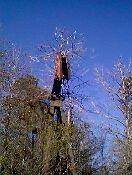|
Global Warming, greenhouse gasses, desertification, loss of the rain forest. These are the knee-jerk passwords of the doomsday theorists, calculated to make mankind aware that we have changed our environment—possibly to the point that we are destroying our environment. Maybe so. I am not trained as a scientist, but I am trained to observe, and I am trained to question the obvious.
Man is incapable of living in an environment without changing it. We have neither fur nor claws. We can't fly. We have to produce shelter to remain in an area, and we are social creatures, dependent on the complex interactions of a society to produce what we consume. The fact that we modify our environment is inescapable. The fact that we live in almost every environment is also inescapable. From the deserts of Africa to the tundra of the frozen north, man has made his home. We have even wintered over on Antarctica.
A lifelong resident of Louisiana, I have tramped across the fields, forests and swamps of this state, looking and prodding and camping, hunting and fishing. Louisiana is one of the great oil-producing states in our nation. It is truly hard to walk across any part of this state and not stumble on the evidence of the petroleum industry in the form of working or abandoned oil wells, tanks, or pipelines. We have had our share of ecological disasters, great and small. In the early years of the past century, we drilled wells all across the state, extracting oil and gas to fuel the industrialization of the 20th century. Some of what our fathers and grandfathers did was truly harmful to the land.

The Medusa Well |
Yet life goes on. I am heartened by the picture of vines growing on an abandoned oil well. These vines will drop leaves, which will gather on the platforms of the well. The platform will rust, adding nourishment to the vine and the ground below. Those leaves will compost, adding to the richness of the soil. At some time in the future, if not in my lifetime, then in the lifetime of my grandson, the well will lose the strength to support itself and the weight of the accumulated foliage. It will topple to the ground. Wind and rain will erode the steel members; even more iron oxide will nourish the earth.
Down the road from the well, the "Medusa Well" we call it, is a slough, actually an oxbow lake. A thousand years ago that lake was part of the river system that fed the Catahoula marsh in Central Louisiana. Sometime in the past century that slough was destroyed by salt water drained from a producing well. For years the water was devoid of life, yet animals now use it, fish swim in it, plants grow along the periphery. Life goes on.
We decry the increased proliferation of greenhouse gasses, yet those gasses are necessary in a greenhouse. Those gasses grow plants. Plants use carbon dioxide to produce oxygen. We need oxygen. Global warming has been blamed for climate changes across the world, yet studies show that regions change over time, whether man is there to modify the environment or not. The earth that I till in my garden was once an ocean floor. It may be again, one day.
To say that we are going to destroy the earth is the height of arrogance. This old rock is going to keep spinning around the sun for millions of years. There will be life on it, as there has for millions of years. Our technology will advance and we will continue to modify our world. We may foul our nest to the point where we can no longer live in it, but life will continue.
And some other civilization of intelligent beings will find fossils and relics and artifacts pointing to the fact that we were here. And they will worry and ponder and make mistakes. And life will go on.
Copyright 2002 by Dennis Dezendorf
|